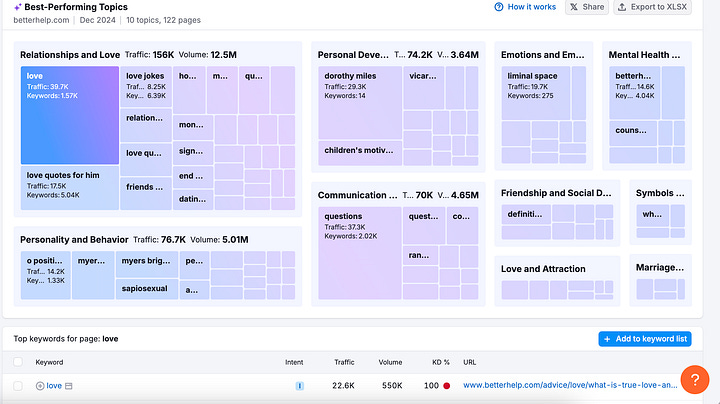Google's Project Astra: how it impacts SEO
So, what does Project Astra mean for SEO? At a surface level, you might think it has zero impact on SEO
This week’s newsletter is sponsored by Tooltester, North Star Inbound, and Semrush. See their case studies linked in the newsletter.
SEO traffic down? Take control by building an email list.
Google updates come and go, but a strong email list keeps your audience engaged. EmailTooltester's Free Email Marketing Course is designed for SEOs and niche site owners who want more loyal visitors, more conversions, and more ❤️ from Google.
Check out the new topics feature from Semrush that allows users to skip multiple research steps to get a quick overview of a competitor’s key topics.
Google's Project Astra is one of the most significant leaps forward in AI capabilities for daily use. Imagine an AI assistant that doesn’t just process your words but understands your tone of voice, facial expressions, and even the images you share. Astra is a multimodal AI capable of interpreting information from text, speech, images, and videos to grasp context and intent like never before.
Check out this video from Google.
One of Astra’s standout features is its visual memory. This AI doesn’t just "see" images; it remembers and interprets them. As you saw in the video above, point your phone camera at something, and Astra can identify it, share its history, and explain its significance. This ability to understand and recall visual cues opens a new realm of possibilities in AI interactions, making our engagements with technology far more dynamic, human-like, AND scary.
Sponsored by Semrush
Semrush’s new topics feature is now one of my favorite research tools. Rather than needing find popular URL’s and then look at the keywords for those URL’s, I can skip right to the topics. In the topics tab, I can evaluate the size of each topic by generated traffic and ranking keywords and pages and then from there, check out the list of keywords that a page is ranking for.


Check it out for any domain today.
Astra (knowing Google, this name will keep changing, so in the future, swap that word in) is designed to facilitate conversational, free-flowing interactions. Imagine chatting with a knowledgeable friend who answers your questions quickly and understands the nuance behind them. Astra elevates AI from transactional to relational, offering personalized, contextually accurate, and highly intuitive responses.
Astra and SEO
So, what does Project Astra mean for SEO? At a surface level, you might think it has zero impact on SEO, just like the prevalence of millions of Google assistant devices in people’s homes, which didn’t change SEO much, but that’s flawed thinking.
Google earns the bulk of its revenue from search, so any innovation it pursues and launches will impact search somehow.
(Google’s Waymo doesn’t directly impact search, but you can be confident that many of the visual recognition features adopted in their self-driving cars also made it into products like Google Images and Lens. )
Astra shows how Google can increasingly focus on understanding users rather than relying on traditional keyword signals. More than ever, it’s time to focus on the humans and the intent behind those humans’ needs.
Nuance
Astra’s enhanced ability to understand nuanced context means keyword stuffing and robotic optimization will become relics of the past. This might even be where Google can detect low-quality AI content and learn to demote it. Content must address user needs authentically and comprehensively. Natural language with natural grammar will be prioritized over perfect syntax.
Multimodal
Astra’s capability to integrate text, voice, images, and video means search queries will become more dynamic. Users might combine images with spoken queries or text with video context, creating new ways to express intent. While this is not how many people search today, it could be because the search with these features is not as efficient as it could be. That will change.
Twenty billion searches monthly happen on Google Lens, and the number will only grow as the feature's capabilities improve. To optimize multimedia content (images, videos, audio), use descriptive file names, alt text, captions, and transcripts. You might think these attributes are unnecessary, but they will likely still reinforce AI’s understanding of non-text objects.
Freshness
With Astra integrating real-time data, freshness will play a more significant role in ranking. Outdated or static content might lose visibility, especially for time-sensitive searches. To maintain relevance, regularly update evergreen content - not just the date on the top, but the content itself needs to remain relevant. For trending topics or events, prioritize publishing timely, authoritative updates that are actually meaningful for humans.
Personalization
As Astra fine-tunes its understanding of individual users, search results will become more personalized. (See my predictions for this year.) Two users searching for the same query may see different results based on their preferences, history, and current needs. This has never happened despite previous personalization announcements, but that’s because the personalization wasn’t that good. AI makes it great.
Voice
Astra’s conversational AI will make voice search even more prevalent. Voice doesn’t yet mean that voice will surface audio responses, but it does mean the query strings will change. Users will ask longer, more conversational questions, and your content needs to adapt.
Optimize for natural language and long-tail queries. Consider including FAQ sections that address common questions conversationally not for the keyword value, but because they are “frequently asked.”
Prepare for the future
Astra isn’t just about technological evolution; it's about changing how people discover, learn, and function. AI integrated into search isn’t just an algorithm improvement; it’s a fundamental advancement in how search engines understand the world.
As I wrote last week, SEO is not dead but needs to change.
Focus on intent: Build content that solves real problems and aligns with user goals. Go beyond surface-level optimization to address the "why" behind a search.
Leverage visual storytelling: Images and videos are no longer just aesthetic elements. Ensure your visuals are informative and engaging, as Astra/Google will interpret their context and significance.
Think beyond text: As multimodal search rises, your content should be accessible across formats—text, video, voice, and images—to meet users wherever they are.
Stay agile: SEO is an ever-evolving field. Monitor trends, test new strategies, and be ready to adapt as Astra and similar models reshape the world of search.
More than ever, the future of search isn’t about keywords, backlinks, or meta tag tweaks alone. It’s about crafting meaningful experiences and trusting AI like Astra will recognize and reward those efforts.
The oldest SEO advice is as relevant as ever: Stop creating for search engines. Start building for people.
Brought to you by North Star Inbound—the sales enablement SEO agency.
Drive High Intent Leads with SEO.
What happens when you combine best-in-class SEO with conversion optimization?
BigRentz's traffic increased by 186% (85k), added 1950 conversions in 12 months.
Self Financial's traffic increased by 50k/month, and added 685 new customers.
Lastly, Secure Data added 1968 phone calls.
North Star Inbound’s SEO strategies earn leads, conversions, and revenue..
Book a call for a free content audit and 10% off any engagement.



